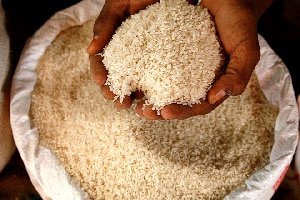Local rice industry players have backed government’s decision to implement what is known as the Cargo Tracking Note (CTN), aimed at preventing importers from under-declaring their goods, saying it will enhance fairness in the rice market and ensure both local and foreign rice are sold at their right prices.
For so long, imported rice, especially for those smuggled into the country or under-declared at the ports, has been sold cheaper than that produced locally, a situation which worsens the plight of already struggling local producers.
“We are working hard to increase production in the rice industry and so when importers do not pay the right duty, it means that we are getting rice at prices less than the locally produced ones. Already, we are uncompetitive in terms of financial risk support,” Evans Sackey Tye, Executive Secretary of the Ghana Rice Interprofessional Body (GRIB), told the B&FT in an interview.
“Other rice-producing countries have lower interest rates on loans, whereas we have huge interest rates. So, this, in the first place, is making pricing very uncompetitive and this is deterring people from investing in the rice industry because when they invest, they cannot even sell the rice at good prices.
But the more you reduce the price, the more you lose, and that is not encouraging investment in the rice sector,” he said.
“What we have done at the local level is to campaign for people to consume local rice and we are seeing good results in that. So, as an industry, what we are focused on is producing more. So, if this [smuggling and under-declaration] is not worked on, we will produce more and we will not be able to sell and the work we are doing will backfire.
When that happens, the farmers will stop planting the rice and move to other foods because they don’t have market for the rice. So, it will be very helpful if the CTN will be enforced. For us, it is the enforcement that matters.”
Recent investigations by the B&FT show that large rice importers in the country are cheating and making away with over US$21million annually — mainly through under-declaration and misclassification of products — at a time government needs more revenue to carry out its projects.
Documents sighted by the B&FT show that the major importers — which control about 60-70 percent of rice imports into the country – together with other minor importers, are all complicit in this corrupt act.
For example, in June 2017 for a quantity of 500MT 1kg bagged fragrant rice bought by one of the importers in Vietnam at US$572 and valued at US$286,000, the importer under-declared it at US$440—giving it a total value of US$220,000.
Finance Minister, Ken Ofori-Atta, announced in parliament last week during the Mid-Year Budget Review presentation that government has, since the beginning of July, implemented the CTN to address corruption at the ports and increase revenue.
“Experience at the Ports indicates that clearing agents and some importers collude to provide false invoices and manifest leading to huge revenue losses. To remedy this situation, the GRA has since 1st July, 2018 been implementing the Cargo Tracking Note (CTN) system to allow it have access to cargo information for all imports before the vessels arrive in the country.
This measure enables GRA to close the information gap between Ghana Customs and trade partners and ensure the correct classification and valuation of all imports. The GRA will intensify this measure to minimize abuse by importers,” he said.
And if that happens the local industry will grow. If there is fair competition, the industry will be attractive, and investors will be willing to invest in local producers, because they will now have confidence in them,” Abena Abedi, CEO of Sustainable Agro, a local rice producer, said.
The country’s current rice consumption is about 1.8 million tonnes, with local rice production less than 600,000 tonnes. The Ministry of Agriculture is expecting rice production to hit about 630,000 tonnes by end of the year.
Business News of Friday, 27 July 2018
Source: thebftonline.com

















